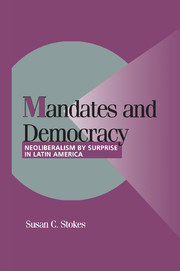Book contents
- Frontmatter
- Contents
- Preface
- 1 ELECTIONS, MANDATES, AND REPRESENTATION
- 2 ELECTIONS AND ECONOMIC POLICY IN LATIN AMERICA
- 3 EXPLAINING POLICY SWITCHES
- 4 ARE PARTIES WHAT'S WRONG WITH DEMOCRACY IN LATIN AMERICA?
- 5 NEOLIBERALISM WITHOUT MANDATES: CITIZENS RESPOND
- 6 MANDATES AND DEMOCRATIC THEORY
- 7 SUMMARY, PREDICTIONS, UNSETTLED QUESTIONS
- References
- Author Index
- Subject Index
- Titles in the series
3 - EXPLAINING POLICY SWITCHES
Published online by Cambridge University Press: 10 December 2009
- Frontmatter
- Contents
- Preface
- 1 ELECTIONS, MANDATES, AND REPRESENTATION
- 2 ELECTIONS AND ECONOMIC POLICY IN LATIN AMERICA
- 3 EXPLAINING POLICY SWITCHES
- 4 ARE PARTIES WHAT'S WRONG WITH DEMOCRACY IN LATIN AMERICA?
- 5 NEOLIBERALISM WITHOUT MANDATES: CITIZENS RESPOND
- 6 MANDATES AND DEMOCRATIC THEORY
- 7 SUMMARY, PREDICTIONS, UNSETTLED QUESTIONS
- References
- Author Index
- Subject Index
- Titles in the series
Summary
When politicians run on one platform and implement another, people often instinctively infer that they have self-interested motives and are turning their backs on their constituents. Yet as I show in this chapter, under some conditions politicians who wish to represent their constituents will change policies, even abruptly, upon taking office. I explore the strategic settings in which politicians who are trying to represent constituents well may immediately renege on campaign pronouncements, as well as settings in which politicians switch in self-interest and at the expense of constituents. I then turn to the Latin American experiences and argue that policy switches were often carried out by politicians who were attempting to represent constituents.
Representatives and Rent-Seekers
The first model I turn to draws on the fact that voters are not always certain about the impact of policies on their welfare. Although they have beliefs about how policies will affect them, these beliefs can change in response to the outcomes they observe after policies are carried out. Perceiving this uncertainty, governments may switch to policies that are initially unpopular in order to advance their constituents' interests and win reelection.
Consider a two-period world in which politicians run for office and then for reelection at the end of the term. They have beliefs about which policy is best for voters. Candidates' beliefs are not known to voters, and the candidates must decide whether to reveal or conceal these beliefs in the campaign before the first election. The candidate who wins must then decide which policy to implement. Politicians care about maximizing voters' utility income and about holding office.
- Type
- Chapter
- Information
- Mandates and DemocracyNeoliberalism by Surprise in Latin America, pp. 60 - 101Publisher: Cambridge University PressPrint publication year: 2001

